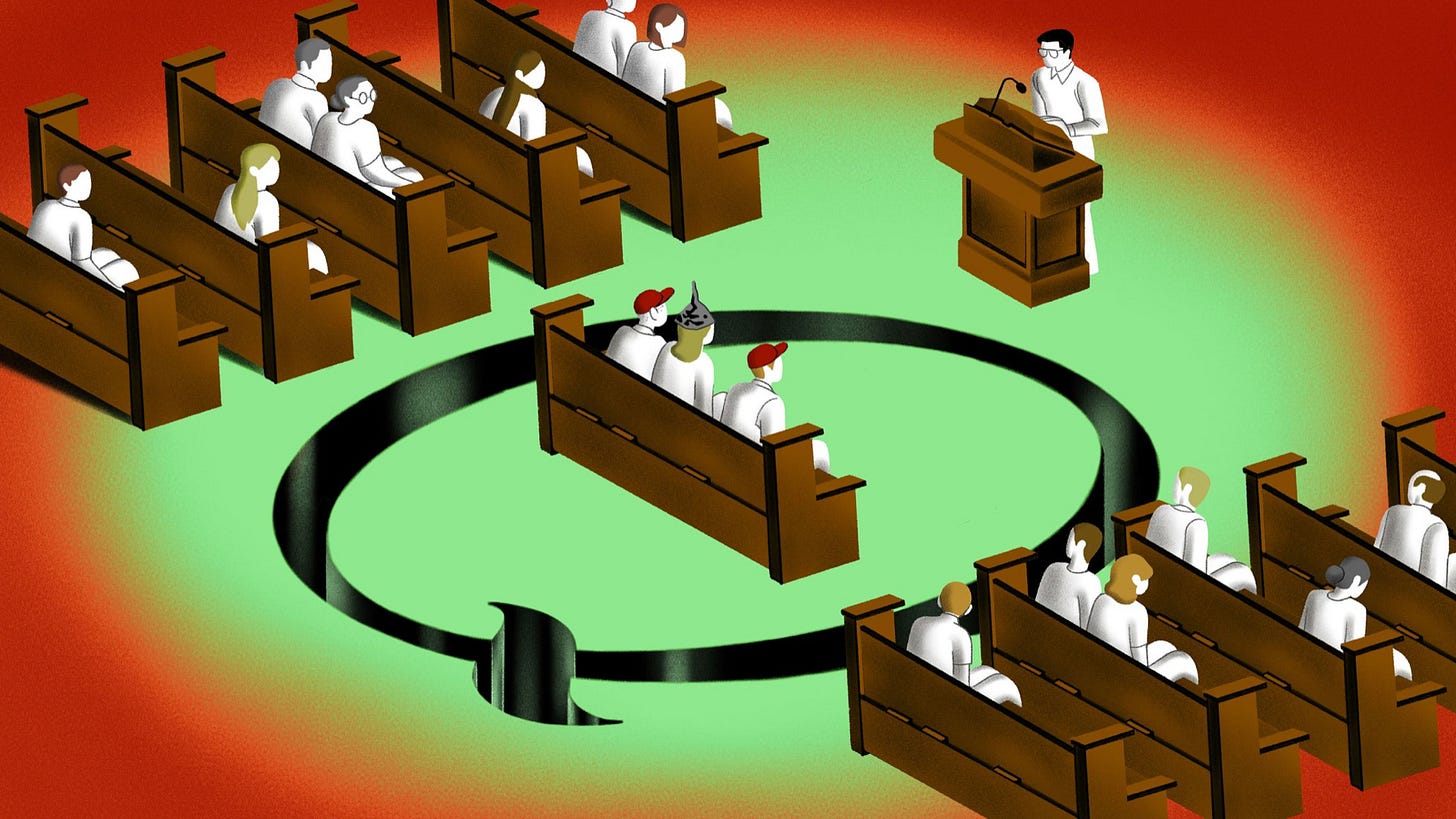7:30-min read
Hello from 20 Minutes into the Future. In this edition we’re looking at what regulations and protections we need before Zuckerberg’s behemoth topples. Because it will happen one day and we need to be ready.

Carl Öhman and Nikita Aggarwal, researchers at Oxford, recently garnered headlines for a new paper they published. In it they argue that we’re too dependent on Big Tech and that there are no protections in place should one of the giants fall. They use a hypothetical collapse of Facebook to explore the “legal and ethical risks” for society. Finally they recommend several policy ideas to protect us should the seemingly impossible happen.
The trash heap of history
And there are precedents as they point out. Friendster, Yik Yak, Google+, Yahoo Groups have all closed down. Never mind zombie platforms like My Space or Foursquare that exist in a weird, languid torpor profiting from the last puffs of data exhaust in their tanks.
These examples highlight a few common themes:
“Critically, they demonstrate that the closure of Facebook’s main platform does not depend on the exit of all users; Friendster, Google+ and others continued to have users when they were sold or shut down.”
“any user flight that precedes Facebook’s closure would probably be geographically asymmetrical, meaning that the platform remains a critical infrastructure in some (less profitable) regions, whilst becoming less critical in others. For example, whilst Friendster started to lose users rapidly in North America, its user numbers were simultaneously growing, exponentially, in South East Asia. It was eventually sold to a Filipino internet company and remained active as a popular social networking and gaming platform until 2015.”
“a key reason for user flight was the greater popularity of another social network platform: namely, MySpace (Piskorski and Knoop, 2006) and Facebook (Torkjazi et al., 2009). Young, white demographics, in particular, fled MySpace to join Facebook (boyd, 2013).”
The one-two punch of regulation and competition
The authors put forward two main reasons Facebook might fall.
The first is widespread global pressure from regulators and advertisers. Frameworks like GDPR and CCPA have already impacted Facebook’s ability to collect, analyse, and profit from user data. The company’s poor performance on a host of issues puts them at commercial risk as well. As we’ve seen with the recent Stop Hate For Profit campaign.
The second is new patterns, new models, and new networks. The company has been able to avoid competition to date through acquisition (Instagram, WhatsApp) and rampant IP theft (SnapChat, TikTok). What happens when Facebook can’t buy or copy their way out of a real competitive threat? Or still further, if past actions are undone? Prominent politicians on both sides of the isle in America have floated the idea of rewinding the company’s purchases.
The risks
The researchers identified a number of broad groups of users—”ethical stakeholders” in their parlance—that need protections:
Dependent communities: These are people for whom Facebook is synonymous with The Internet. Think of the 100 million people who can only get online through Facebook’s Free Basics program. This grouping also includes media companies (Think Buzzfeed, Huff Post) that are increasingly trapped in the newsfeed. Companies who’s financial success is dictated by Zuckerberg’s algorithms. Facebook is a public utility—no different from electricity or water— for these communities.
Existing users: Individuals with active (or even deactivated) accounts. People who have shared and stored vast troves of personal data. Photos, videos, conversations with loved ones, etc. What happens to all that when Facebook goes away? What harms might you be subject to if you no longer have access or control of that data?
Non-users: People who have never used Facebook (but still have shadow profiles), people who have ceased using Facebook, and deceased users. The latter represent real challenges. Existing data protection frameworks only protect the living. There is literally nothing stopping Facebook from selling off assets from dead users. This is problematic given we’re only a few decades away from the dead outnumbering the living on Facebook.
Future generations: What happens to cultural memory and heritage when one private company holds all of it? What opportunities do people not yet living lose as a result? What happens to whole fields of human endeavour like history and sociology?
Many people save various things in digital format, and if they fail to alert others of and provide access to those things, certain memories and stories of their lives could be lost forever. This is a loss not only for a descendant’s legacy and successors but also for society as a whole. […] This is especially true of social networking accounts, which may be the principal—and eventually only—source for future generations to learn about their predecessors
New frameworks, new policies
Öhman and Aggarwal argue for an array of measures that would afford people greater control over their data in the event of a platform collapse, stronger legal protections for the dead, creating incentives for Facebook to preserve significant data for future generations:
Under a data trust structure, Facebook would act as a trustee for user data, holding them on trust for the user(s) — as the settlor(s) and beneficiary(ies) of the trust — and managing and sharing the data in accordance with their instructions. Moreover, a plurality of trusts can be developed, for example, designed around specified groups of aggregated data (in order to leverage the economies of scope and scale of large, combined data sets). As a trustee, Facebook would be subject to a fiduciary duty to only use the data in ways that serve the best interests of the user.
We recommend that more countries follow the lead of Denmark in implementing legislation that, at least to some degree, protects the profiles of deceased users from being arbitrarily sold, mined and disseminated in the case of Facebook’s closure. Such legislation could follow several different models. Perhaps the most intuitive option is to simply enshrine the privacy rights of deceased users in data protection law, such as (in the EU) the GDPR.
A promising strategy would be to protect Facebook’s archive as a site of digital global heritage, drawing inspiration from the protection of physical sites of global cultural heritage
More immediately and more critically the pair draw parallels to the idea of “systemically important financial institutions” (i.e. “too big to fail”) by suggesting a “systemically important technological institutions” regime.
The regulatory framework for SITIs should draw on existing approaches to regulating SIFIs, critical national infrastructures and public utilities, respectively. In the insolvency context, drawing upon best practices for SIFI resolution, the SITI regime could include measures to fast-track insolvency proceedings in order to facilitate the orderly wind-down or reorganisation of a failing SITI in a way that minimises disruption to the (essential) services that it provides, thus mitigating harm to dependent communities. This might include resolution powers vested in a regulatory body authorised to supervise SITIs (this could be an existing body, such as the national competition or consumer protection/trade agency, or a newly established ‘Tech’ regulator) — including the power to mandate a SITI, such as Facebook, to continue to provide ‘essential services’ to dependent communities — for example, access to user groups or messaging apps — or else facilitate the transfer of these services to an alternative provider.
In an interview with The Guardian Öhman said:
“Sometimes I get the feeling that the phrase ‘too big to fail’ gets interpreted as ‘so important that it has to be there forever’,” says Öhman, “but actually, we’re saying ‘too big to go down in a tumultuous and disorganised manner.’”
We absolutely need to blow up Facebook but it should be a controlled demolition to protect our best interests. These are interesting ideas to have a conversation around. It’s well past time we start it.
Dig deeper
You can read more about how we can fight back against big tech with these stories from the 20 Minutes into the Future archive:
Not a subscriber yet? 20 Minutes into the Future is 100% ad free and always will be. Sign up for weekly commentary & related links to help you dig deeper into big tech behaving badly.
10 stories this week

Facebook Braces Itself for Trump to Cast Doubt on Election Results
QAnon looms behind nationwide rallies and viral #SavetheChildren hashtags
Evangelicals are looking for answers online. They’re finding QAnon instead.
Sick and tired of big tech behaving badly? 20 Minutes into the Future is about holding the bastards to account. One way we can do that is by spreading the word of their misdeeds.
Bastard watch

Brad Parscale used to spend his days making websites for gun shops before becoming Trump’s web guy. From 2011-15 he made websites for Trump’s winery, his skin-care line, and then his presidential campaign. The rest is history.
Do me a favour and vote Trump out in November. I really don’t want to have to keep thinking about what propagandistic shit this Sons of Anarchy reject is up to.
Kindred spirits

Sarah Gold is a hero of mine and a friend. Sarah’s pioneering work at Projects by IF sets the gold standard for ethical and practical uses of data. Sarah and her brilliant team not only create new products and services but frameworks.
Other designers and consultancies are content to faff about with pixels, Sarah tackles policies. She has an abiding belief that data is the next frontier in the fight to forge a more equitable and sustainable future.
We need more Sarahs and less Brads working in tech today if we want a better tomorrow.
A quick note
Lots on at work and in my personal life at the moment so dispatches might be spotty for the rest of September. Be safe and be well.
Thanks for reading 20 Minutes into the Future. Know someone who'd like the newsletter? Invite them to sign up.
Good night and good future,
Daniel
20 Minutes into the Future is a critical look at how technology is shaping our lives today. And what actions we can take for a better tomorrow. If you're not already a subscriber and found this newsletter worth your while then please sign up.
My name is Daniel Harvey and I write 20 Minutes into the Future. I’m a product designer and have written for Fast Company, Huffington Post, The Drum, & more. If you're pissed about the current state of tech and want to see us do better then you’ve found a kindred spirit.
You can email me at daniel.harvey@gmail.com or follow me on Twitter @dancharvey. Or add a comment to this post now.



